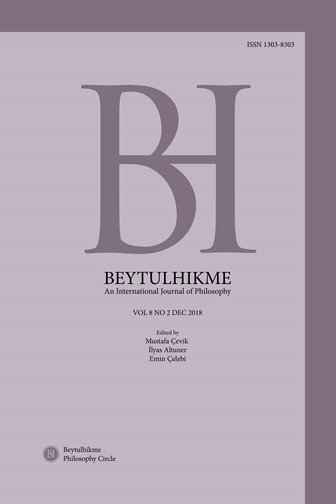Author :
Abstract
“Bazı”, “en az bir” ve “birkaç” gibi tikel bir kaplamı gösteren Türkçe sözcükler cümlenin öznesine kısmi bir yüklemenin yapılacağını işaret ederler. İlk bakışta basit gibi görünen bu durum, özne ve yüklemden oluşan basit önermelerdeki bu iki kavramın birbiriyle varlıksal (ontolojik) ilişkisinin sonucunda oluşur. Tümel ve tikel önermeler olumlu ve olumsuz oluşuna göre dört standart formda belirir. Bu önermelerin öznesi ve yüklemi de tümel kavramlardan oluşur. Dolayısıyla iki tümel kavramın cümle yapısı içindeki tür-cins ilişkisinin tarzı, önermenin de tümel ya da tikel oluşuna yol açar. Ayrıca tikelin varlığa, tümelin yokluğa vurgusu, önermenin varlığı ya da yokluğu da işaret etmesi sonucunu doğurur. Bu çalışma kavramsal ve önermesel düzeyde bu ilişkileri tartışarak ve ontolojik yönünü sergileyerek “tikel”in var oluşsal yükü olduğunu da göstermiş olacaktır.
Keywords
Abstract
Turkish words such as “bazı” (some), “en az bir” (at least one) and “birkaç” (a few) show a particular extension and indicate a partial loading to the subject of the sentence. This situation, which seems simple at first glance, is the result of the ontological relationship of these two concepts in simple propositions consisting of subject and predicate. The universal and particular propositions appear in four standard forms depending on whether they are positive or negative. The subject and predicate of these propositions also consist of universal concepts. Thus, the style of the species-genus relationship within the sentence structure of the two universal concepts leads to the universal or particular of the proposition. In addition, the proposition suggests the existence or the absence as a result due to the emphasis of the particular to the existence and of the universal to the absence. This study will show that there is an existential load of the particular by discussing these relations at the conceptual and propositional level and exhibiting ontological aspects.
Keywords
- Aristoteles (2002). Kategoriler. (Çev. S. Babür). İstanbul: İmge Kitabevi.
- Arslan, A. (2016). İlkçağ Felsefe Tarihi 2: Sofistlerden Platon’a. İstanbul: İstanbul Bilgi Üniversitesi Yayınları.
- Çiçekdağı, C. (2018). Peri Hermeneias Üzerine İki Yorum. Bursa: Sentez Yayıncılık.
- Güçlü, A. B. & Uzun, E. & Uzun, S. & Yolsal, Ü. H. (2002). Felsefe Sözlüğü. Anka- ra: Bilim ve Sanat Yayınları.
- Kant I. (1992). Immanuel Kant’s Critique of Pure Reason. (Trans. N. K. Smith). Lon- don: MacMillan.
- Kelikli M. (2018). Protasis and Apophansis in Aristotle’s Logic. Beytulhikme An International Journal of Philosophy, 8 (1), 1-17.
- Kelikli, M. (2017). Aristoteles’te Dictum De Omni. VII. Mantık Çalıştayı Kitabı. (Ed. V. Kamer ve Ş. Ural). İstanbul: Mantık Derneği Yayınları, 397-405.
- Öner, N. (1986). Klasik Mantık. Ankara: Ankara Üniversitesi Basımevi.
- Parlatır, İ. vd. (1998). Türk Dil Kurumu Türkçe Sözlük. Ankara: Türk Tarih Kurumu Basımevi.
- Porphyrios (1986). Isagoge. (Çev. B. Çotuksöken). İstanbul: Remzi Kitabevi.





